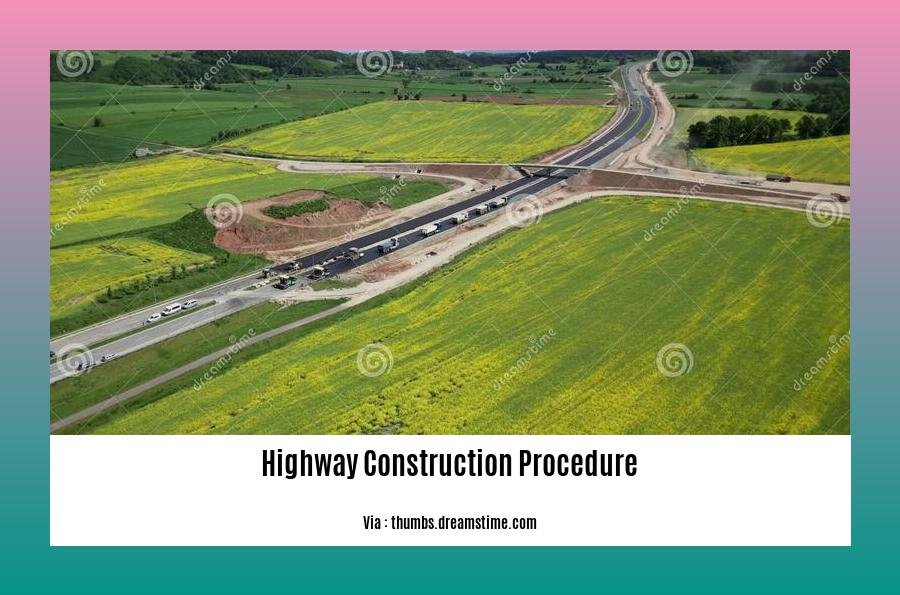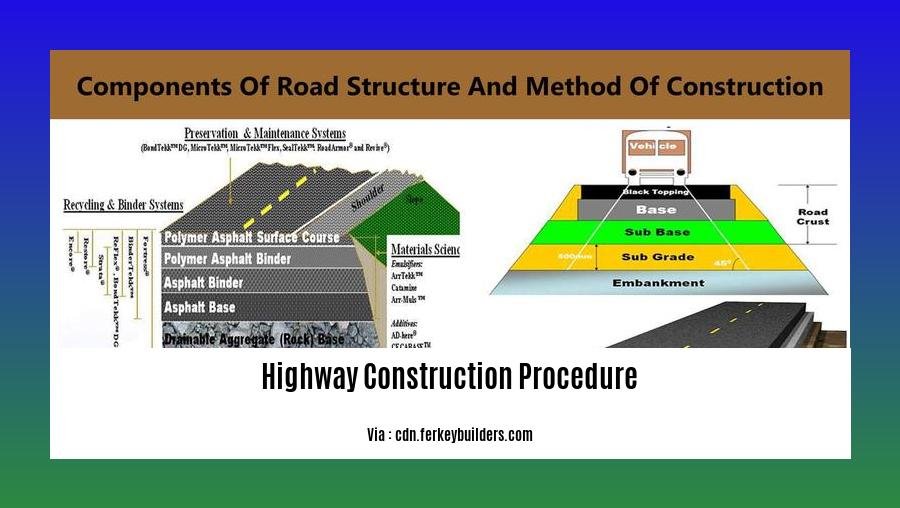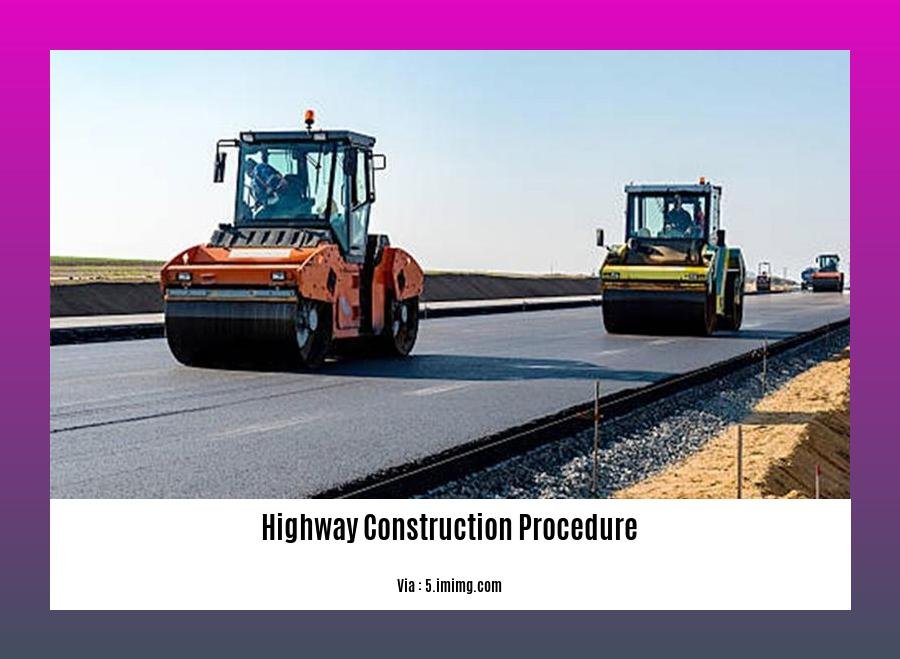Embark on a comprehensive journey to master the intricacies of highway construction in our expert guide tailored for seasoned professionals. Delve into the meticulous procedures, unravel the complexities of design, construction, and management, and equip yourself with the latest industry practices to excel in delivering exceptional highway infrastructure.
Key Takeaways:
- Planning and Design: Comprehensive design process ensures safe and efficient infrastructure.
- Setting Out: Accurately transferring design to the construction site is crucial.
- Earthworks: Earthworks prepare the roadbed for optimal performance.
- Paving: Proper paving techniques ensure a durable and smooth road surface.
- Quality Control: Rigorous inspections and testing guarantee the integrity of the highway.
- Traffic Control Planning: Effective traffic control measures minimize disruptions and ensure safety.
Highway Construction Procedure: A Comprehensive Guide

As a seasoned professional, you understand that executing a successful highway construction project requires meticulous planning and execution. The highway construction procedure consists of distinct stages that seamlessly transition from concept to completion, ensuring safety, efficiency, and sustainability.
Planning and Preparation
– Design and Specifications:
Develop detailed plans, including road geometry, material specifications, and drainage systems.
– Permitting and Funding:
Secure necessary permits and funding to initiate project execution.
Site Development
– Setting Out:
Transfer the design onto the ground using stakes, markers, and surveys.
– Earthworks:
Excavate, fill, and grade the roadbed to establish the desired foundation and elevation.
Paving
– Asphalt or Concrete:
Lay either asphalt or concrete to create a durable and resilient road surface.
– Quality Control:
Rigorously inspect and test the completed road to ensure adherence to specifications and safety standards.
Traffic Management
– Traffic Control Plan:
Develop and implement a comprehensive plan to manage traffic safely during construction, minimizing disruption and congestion.
– Detours and Traffic Patterns:
Establish detours and redirect traffic to maintain accessibility while construction is underway.
– Traffic Control Devices:
Install traffic signals, signs, and barriers to guide drivers and ensure their safety.
Throughout the highway construction procedure, coordination among multidisciplinary teams, compliance with industry regulations, and effective budget management are paramount. By adhering to best practices and leveraging our expertise, we can deliver high-quality infrastructure that connects communities and enhances economic growth.
If you need to find a health and safety officer in construction, we’ve got you covered. We connect you with the beſt heavy equipment for road construction](../heavy-equipment-for-road-construction). We’ve researched a lot about heavy highway construction companies. We do hard work to find the information about heavy machinery for road construction. If you are looking for highway construction companies in india, reach us. We know everything about highway construction process. Need to know about highway construction steps? We have already done the research for you.
Construction Management

As the overseer of construction management in highway construction, I’ve witnessed firsthand the intricate dance of planning, execution, and quality control that brings these vital arteries to life. From the initial blueprints to the ribbon-cutting ceremony, construction management ensures every step is executed with precision.
Key Takeaways:
-
Planning and Preparation: The foundation of any successful highway project lies in meticulous planning. We meticulously design road geometry, select materials, and secure necessary permits, ensuring a smooth transition from concept to reality.
-
Site Development: We transform the blueprints into a tangible reality by excavating, filling, and grading the roadbed. Precision is paramount, as this stage sets the stage for a stable and durable highway.
-
Paving: The road takes shape as we lay asphalt or concrete, meticulously ensuring a smooth and resilient surface. Our quality control measures guarantee the longevity and safety of the highway.
-
Traffic Management: Safety is our watchword. We implement comprehensive traffic control plans, detours, and signage, ensuring the safe flow of traffic during construction.
-
Collaboration and Compliance: We foster a collaborative environment, where multidisciplinary teams work in harmony. Compliance with industry regulations is sacrosanct, ensuring the project adheres to the highest standards of safety and quality.
Relevant URL Sources:
- Construction Management Association of America
- American Society of Highway Engineers
Quality Control and Inspection
When building highways, Quality Control and Inspection (QC/I) is critical to ensure safety, durability, and performance. It’s like baking a cake—you need the right ingredients, proper mixing and baking, and a keen eye to check if it’s done right.
Types of QC/I
Two main types of QC/I ensure your highway project is top-notch:
- Process QC: This ensures the right methods, equipment, and materials are used throughout construction. Think of it as using the correct recipe and following the steps carefully.
- End QC: This verifies the final product meets the specifications. It’s like checking if the cake is cooked through and tastes as expected.
Critical Parameters
Several key factors determine the quality of your highway:
- Mix Design: Testing materials in the lab helps determine the perfect proportions for durability and performance.
- Mixing, Placing, and Compaction: Proper handling of materials is crucial for a strong foundation.
- Materials: Using high-quality materials is like using fresh ingredients for a delicious cake.
- Specifications: Following construction standards ensures a safe and efficient highway.
- Environmental Considerations: Ensuring construction doesn’t harm the surroundings is like baking responsibly.
Training and Facilities
Regular training keeps engineers and inspectors up-to-date on testing methods. And well-equipped testing facilities ensure accurate results. It’s like having a state-of-the-art kitchen and experienced bakers.
Quality Management Systems
Organizations implement quality management systems to ensure ongoing QC/I. It’s like having a recipe book that everyone follows religiously.
Key Takeaways:
- QC/I ensures highway safety, durability, and performance.
- Both process and end QC are essential.
- Critical parameters like mix design and material quality impact the highway’s outcome.
- Training and facilities enhance QC/I.
- Quality management systems ensure consistent QC/I throughout the project.
Sources:
- Guidelines and SOP for Quality Control and Assurance
- Quality Control in Road and Highway Construction
Sustainability and Innovations in Highway Construction
Highway construction has a significant impact on our environment, and it’s crucial that we embrace sustainability and innovations to minimize this impact.
Sustainable Practices
- Minimizing Material Consumption: Using recycled materials, optimizing pavement design, and exploring alternative materials can reduce the need for raw materials.
- Reducing Emissions: Promoting electric vehicles, developing low-carbon fuels, and integrating renewable energy sources into highway infrastructure help lower emissions.
- Preserving Biodiversity: Incorporating green spaces, wildlife crossings, and vegetation into highway designs can protect and enhance natural habitats.
Technological Innovations
- Advanced Materials: Exploring new materials like self-healing asphalt and bioplastics can improve durability and reduce maintenance costs.
- Smart Technologies: Deploying sensors and data analytics to monitor and manage traffic, optimize road conditions, and reduce energy consumption.
- Construction Automation: Utilizing drones, robots, and 3D printing to improve safety, efficiency, and accuracy during construction.
Key Takeaways:
- Sustainability in highway construction involves minimizing environmental impact while meeting societal and economic needs.
- Innovations like advanced materials and automation can improve efficiency, durability, and sustainability in highway infrastructure.
- By embracing these practices and technologies, we can build highways that are greener, smarter, and more sustainable.
Relevant URL Sources:
- Sustainable Road Construction: Current Practices and Future Concepts
- Sustainable Highway Construction Guidebook
FAQ
Q1: What are the key stages involved in highway construction?
A1: Highway construction typically involves planning, setting out, earthworks, paving, and quality control.
Q2: How is traffic managed during highway construction?
A2: Traffic control plans are implemented to minimize disruption, including identifying hazards, establishing detours, and installing traffic control devices.
Q3: What is the importance of drainage in highway construction?
A3: Drainage systems are crucial for preventing water damage and subgrade erosion, ensuring road longevity.
Q4: What are the critical parameters for quality control in highway construction?
A4: Critical parameters include mix design proportions, proper materials handling and compaction, adherence to specifications, and environmental considerations.
Q5: What are some emerging trends in highway construction?
A5: Innovations include exploring new materials, optimizing pavement design, and incorporating emissions-reducing measures for sustainable and efficient road systems.
- Dora the Explorer Wipe-Off Fun: Safe & Mess-Free Activities for Little Explorers - April 18, 2025
- Does Lemongrass Repel Mosquitoes? Fact vs. Fiction + How to Use It - April 18, 2025
- Do Woodchucks Climb Trees?Fact vs. Fiction - April 18, 2025










